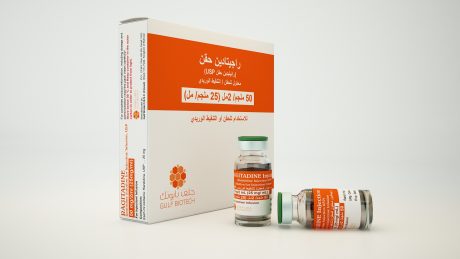Description
What is Ranitidine?
Ranitidine belongs to a group of drugs called histamine-2 blockers. It works by reducing the amount of acid your stomach produces. Ranitidine is used to treat and prevent ulcers in the stomach and intestines. It also treats conditions in which the stomach produces too much acid, such as Zollinger-Ellison syndrome.
Ranitidine also treats gastroesophageal reflux disease (GERD) and other conditions in which acid backs up from the stomach into the esophagus, causing heartburn.
Important Information
Using ranitidine may increase your risk of developing pneumonia. Symptoms of pneumonia include chest pain, fever, feeling short of breath, and coughing up green or yellow mucus. Talk with your doctor about your specific risk of developing pneumonia.
Do not use this medication if you are allergic to ranitidine.
Ask a doctor or pharmacist if it is safe for you to take this medicine if you have kidney disease, liver disease, or porphyria.
Heartburn is often confused with the first symptoms of a heart attack. Seek emergency medical attention if you have chest pain or heavy feeling, pain spreading to the arm or shoulder, nausea, sweating, and a general ill feeling.
Ranitidine granules and effervescent tablets must be dissolved in water before you take them. Your doctor may recommend an antacid to help relieve pain. Carefully follow your doctor’s directions about the type of antacid to use, and when to use it. Avoid drinking alcohol. It can increase the risk of damage to your stomach. It may take up to 8 weeks of using this medicine before your ulcer heals. For best results, keep using the medication as directed. Talk with your doctor if your symptoms do not improve after 6 weeks of treatment.
Before using Ranitidine
Do not use this medication if you are allergic to ranitidine.
Heartburn is often confused with the first symptoms of a heart attack. Seek emergency medical attention if you have chest pain or heavy feeling, pain spreading to the arm or shoulder, nausea, sweating, and a general ill feeling.
Ask a doctor or pharmacist if it is safe for you to take this medicine if you have:
- kidney disease;
- liver disease; or
- porphyria (a genetic enzyme disorder that causes symptoms affecting the skin or nervous system).
Ranitidine is not expected to be harmful to an unborn baby. Tell your doctor if you are pregnant or plan to become pregnant during treatment. Ranitidine passes into breast milk. Do not take this medicine without telling your doctor if you are breast-feeding a baby.
Using this medicine may increase your risk of developing pneumonia. Symptoms of pneumonia include chest pain, fever, feeling short of breath, and coughing up green or yellow mucus. Talk with your doctor about your specific risk of developing pneumonia.
The effervescent tablet may contain phenylalanine. Talk to your doctor before using the effervescent tablets if you have phenylketonuria (PKU).


